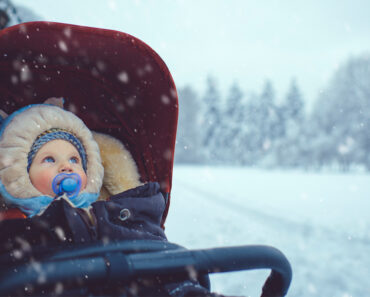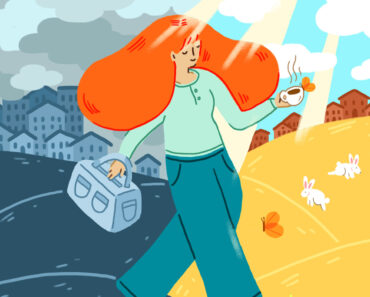Safe sleep rules can be confusing (especially when you’re exhausted). Check this list to make sure you’re avoiding these common baby sleep mistakes.
Newborn sleep: It’s one of the three main things you think about when you have a baby. (There’s sleep, there’s feedings, and there’s basic hygiene, as in, “How many days ago did I shower? Can I wear a sweatshirt with crusted spit-up on it to the paediatrician’s office? Answer: Yes.)
As you’re getting to know your newborn’s sleep needs and ever-changing patterns and rhythms—and adjusting to the new-parent sleep deprivation—you might feel overwhelmed by all the competing baby sleep philosophies in books and on blogs, the endless dos and don’ts, contradictory rules and scary safety warnings. Meanwhile, you’re still wondering how the heck to get your adorable little creature to sleep through the night. There are many ways to do it—it’s up to you to figure out what works—but there are some things you should avoid altogether. Here are seven common baby sleep mistakes you may be making.
1. Don’t assume the mellow, sleepy newborn phase will last forever.
We hate to break it to you, but your dozy, peaceful infant who simply falls asleep, milk-drunk, after a feeding may not always be this way. The first few weeks (or even months) are not always indicative of the kind of sleeper you happened to score in the newborn sleep lottery. Some babies randomly sleep through the night early on (congratulations!) but it doesn’t mean this will continue indefinitely. Have you weathered the four-month sleep regression yet? Yeah, you might want to read up on that. (Sorry.) And even though nursing to sleep or rocking to sleep before naps and bedtime might be working for you now, know that sometimes IT JUST STOPS WORKING. If you’re one of the lucky parents with a “unicorn baby” (this means your baby is sleeping well without much effort on your part), try not to gloat. It doesn’t necessarily mean that you’re doing it right, while that other mom with the colicky, sleepless baby hasn’t figured it out. Believe us, she’s trying.
2. Sleeping on the couch with a newborn in your arms is really dangerous.
We get it, falling asleep on the sofa with an infant curled up on your chest is one of the best feelings in the world. Many an exhausted new mom has nodded off for a bit while her sleeping baby is sprawled across her lap or nestled up all warm and cozy on a breastfeeding pillow. But according to the American Academy of Pediatrics (AAP), this kind of co-sleeping—on a couch or armchair—is a serious newborn sleep mistake. It’s way more dangerous than co-sleeping in a bed, due to the risk of dropping or smothering the baby. If you’re going to nap or sleep with your infant, opt for bed-sharing. And if you’re going to co-sleep or bed-share, watch this video to make sure you’re doing it safely.
3. Don’t let your newborn sleep in the car seat.
This is a contentious one, because we’ve all been there: Your baby conks out in the car seat while you’re driving home or running errands, and the beauty of the bucket seat is that you can pop it out and transfer your sleeping infant inside for the remainder of her nap. But according to the AAP, allowing an infant to sleep in a bucket car seat that’s been placed on the floor or clicked into a stroller is a safety hazard, as the baby’s head can fall forward and cause something called positional asphyxiation. Due to the angle of the seat design, it’s much safer to let your newborn nap in the car seat while it’s attached to the base and installed in the car. Letting your baby sleep in a car seat overnight when you’re not awake enough to check on her is a serious baby sleep mistake. In fact, experts actually recommend limiting the time your baby spends in a car seat, bouncer or swing to 30 minutes, mostly for developmental reasons (it restricts motion) and the risk of developing positional plagiocephaly (aka flattened head syndrome). However, we’d like to acknowledge that this 30-minute maximum is downright impossible on road trips, for parents who have long work or daycare commutes, or when the swing is truly the only place you can get your infant to nap. We’d love to see some more research on this recommendation.
4. Don’t buy those cute crib bumper sets you see on blogs and in catalogs.
This one’s pretty easy to follow: don’t use crib bumpers. They are a SIDS risk, the sale of them is even banned in some US states, and doctors have been lobbying against crib bumpers for years. Yes, some babies flail around a lot in their sleep, especially when they’re on the verge of learning to roll, crawl, or walk. But they probably won’t seriously injure themselves by bumping their heads on a crib rail. While those “breathable” mesh bumpers do a good job of keeping soothers (and little hands and feet) from poking out of the crib slats, they are not recommended due to the risk of entanglement and strangulation. (Also, word to the wise: older, more mobile babies can stand on bumpers and use them as a step when they’re trying to monkey their way of the crib.) And while we’re at it, you shouldn’t use a DockATot or “infant lounger” for unsupervised sleep inside (or outside) the crib, either. They’re technically no longer available in Canada, but similar products are still on the market.
5. Don’t put off sleep training because the baby is teething.
Newsflash: Your baby is always teething. Or sick with a cold. Or coming down with something. Or recovering from something. Or over-tired. Or suffering from Unexplained Fussy Baby Syndrome. (OK, we made that one up. But it’s kinda true.) If you’re hoping to sleep train—plenty of parents don’t—it’s important to know that it may never feel like the right time. Experts say it’s easiest to sleep train a baby between the ages of six and 12 months, but use your judgment and listen to your gut. If you’re not fully committed to sleep training before you start, you won’t stick to it.
6. Stop room-sharing after six months.
This is a tricky one. In October 2016, the AAP announced that parents should room-share with their babies for at least the first six months, and—ideally—for a full year. But by June 2017 the experts had changed their minds on that one, saying that you shouldn’t room-share beyond six months. Because let’s be real: Many parents’ bedrooms only fit a bassinet (not a full crib), and most babies outgrow the bassinet (or start rolling or pulling up on the sides) by month four, five or six. Some babies will wake up in the night more frequently if they hear or smell their parents nearby, and will sleep more soundly in their own room. It’s also pretty hard to teach independent sleep, or do the cry-it-out method of sleep training, if your baby is right next to you. If room-sharing is working for you, great—but don’t feel pressured into it. Researchers aren’t seeing huge benefits after a baby’s older than six months.
7. Don’t let a high-tech baby monitor make you feel over-confident (or overly anxious).
Baby monitors are super useful, but they’re no substitute for avoiding baby sleep mistakes. If you hear your baby stirring, a quick peek at a video monitor can tell you if it’s a full-fledged wakeup, or just some nothing-to-see-here squirming. Sometimes you can get back to your Netflix without opening the nursery door, or quickly pop a paci back in before the situation escalates. But some parents are taking thehigh-tech baby monitor trend to the extreme, buying expensive wearable vital sign devices like Vida or Owlet, a “smart sock” that measures an infant’s heart rate and oxygen saturation levels. Paediatricians advise against using these kinds of cardiorespiratory monitors, as well as the sensors that go under the baby’s mattress, because they can cause false alarms, which make parents anxious and lead to unnecessary ER visits and tests. The head of the AAP’s Task Force on SIDS, Dr. Rachel Moon, says there’s also no evidence that these devices help prevent SIDS in healthy babies. Signing up for alerts and biometric data streaming to your smartphone is no substitute for creating a safe sleep environment for your baby. “We’re worried people will become complacent,” Moon said in a recent statement. “If they have a monitor they might feel they can put their baby on its belly to sleep, or sleep with their baby.” You still need to follow safe sleep guidelines: always put your baby into the crib on her back (not her side or her tummy); keep blankets and pillows out of the crib; and stop swaddling once your baby has learned how to roll.
Read more:
Study: parents STILL aren’t following safe sleep guidelines for babies
How to deal with a cat-napping baby
Rock ‘n Play: Why is a product blamed for infant deaths in the U.S. still available in Canada?

































